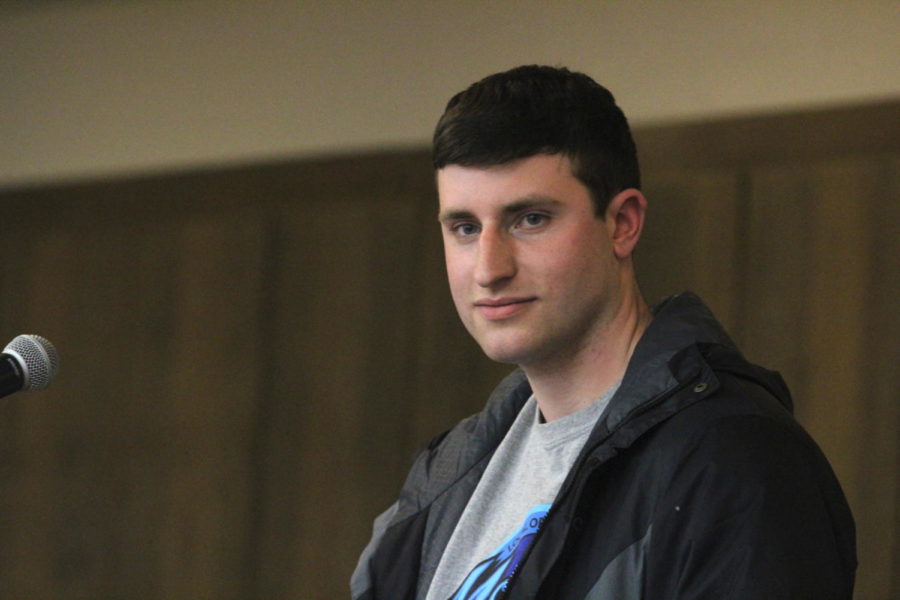Student Government discusses prison labor during open forum, funds student orgs
Kaleb Vanfosson, junior in political science, speaks to the Student Government senate during their meeting in the Campanile Room of the Memorial Union on March 8. Vanfosson and others spoke about the topic of the university’s use of prison labor.
March 7, 2017
Student Government and student organization funding was addressed for the 2018 fiscal year during its meeting Wednesday night, along with touching on the topic of Iowa State’s use of prison labor.
Kaleb VanFosson, junior in political science, voiced his concern over the university’s employment of prison labor specifically due to moral and ethical concerns.
Iowa State often uses prison labor for the building of campus residential equipment.
VanFosson said prisoners make “slave labor of $.50 to $.80 on the dollar” when building furniture, and VanFosson sees “a black mark” left on the campus due to their use. VanFossen urged the Senate to recommend ways to outsource labor to other companies instead of using the Iowa prison force.
Sen. Eric Schultz, on the issue, said Iowa State shouldn’t be too lenient toward prisoners due to prison not “being a fun place that should be revisited.”
Mihir Sathuvalli, freshman in mechanical engineering, proposed the idea of bringing a petition to the Board of Regents on behalf of Iowa State to stop prisoners from working on campus.
“If Student Government could create a petition to be brought to the Board of Regents, then us being one of the largest institutions in Iowa [would] create a domino effect,” Sathuvalli said. “This could influence other universities to act in the same way.”
Schultz responded by stating the difference between slave labor and that which is used by the university.
“If you do the crime, then you do the time, that’s the difference between a slave and prisoner. It’s called consequences,” Schultz said. ”If prisoners want to get outside the prison walls and get fresh air with work, I have no problem with it. It’s labor that teaches them skills they can use after prison.”
Addressing opposing senators viewpoints newly appointed senator Dozmen Lee, a sophomore in political science, believes keeping prisoners on equal footing as other citizens is the best way to keep them on the path to success.
“If you give pig fat to a person every day and then ask them if they still want the fat they’ll say yes, because they want to survive,”Lee said.”Just because you give them something doesn’t make it right.”
Sathuvalli countered Schultz’s point through his disagreement of what qualifies as a skilled trade.
“I don’t think building lofts and desks from IKEA constitutes as a skill,” Sathuvalli said. “Anybody could learn to do that.”
The Senate adjourned the discussion after it was determined the conversation was moving into the realm of debate rather than open forum.
Several student organizations requested approval for additional funding requests that included event transportation, publication circulation and rentals.
The Malaysian Students at ISU proposed the acquiring of $1,040 for their Malaysian Cultural Night, including fees equipment rental and MU AV technicians.
Sir Magazine, due to a mistake in its annual fund allocations, requested $5,600 to be transferred in order to produce 1,000 copies of its spring publication.
In order to pay for its April 7 to April 9 competition, the Swim Club requested $560.34. This money will be used for relay competition registration, transportation and individual competition registration.
The Equestrian Team also requested $300.79 for competition transportation and registration to its March 24 and March 27 event.
The GENRE music club needed $2,010 to pay for its April 22 Battle of the Bands event, while the African Students Association required funding of $3,198.03 to provide food at its African Ethic Night.
All the organizations were funded.
Dozmen Lee, sophomore in political science, also was nominated to fill the open position of United Residences Off Campus senator. After a majority vote, he was sworn into the position.
Lee said he “was tired of sitting around while things happened around him,” causing him to take interest in Student Government and ultimately pursue the position.
Student Government President Cole Staudt also provided an update on his medical amnesty bill, saying the progress was positive. He will continue to advocate for its approval.
If passed, the bill would allow intoxicated individuals to gain access to medical services without fear of legal persecution.







